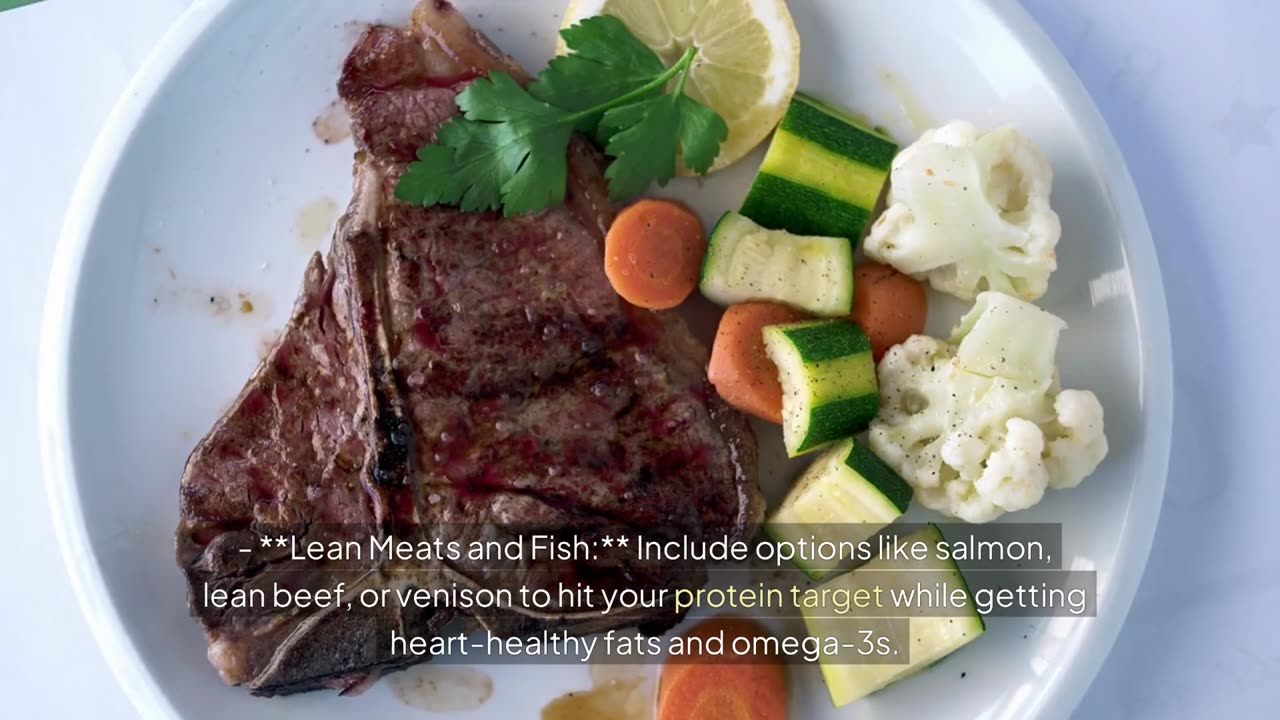Premium Only Content

Are You Really Getting Enough Protein? Why You May Need More Than You Think**
---
**Introduction:**
When you think of a balanced meal, you might imagine a plate filled with vegetables, grains, and maybe a bit of dairy. But what if I told you that for many, this “balanced” meal might be missing a critical nutrient: protein? Protein isn’t just for bodybuilders or athletes—it’s essential for everyone. In fact, most people could benefit from a protein boost to stay strong, energized, and healthy. In this article, we’ll dive into the crucial role of protein, why you likely need more than you think, and how to make sure you’re getting the right amount.
---
### 1. **What is Protein and Why is It So Important?**
Protein is often referred to as the building block of life, and for good reason. Every cell in your body contains protein, which is essential for muscle function, cell repair, and even hormone regulation. Unlike carbohydrates and fats, your body doesn’t store protein, meaning you need a steady intake to maintain optimal health.
But not all proteins are created equal. Complete proteins, like those found in meat, fish, and certain plant sources, provide all nine essential amino acids your body cannot produce. Incomplete proteins, like nuts and grains, lack one or more of these essential amino acids but can be combined to create a complete protein source. This distinction is critical, as it means some foods alone may not provide the full benefits your body requires. Keep reading to learn how these different types of protein impact your health.
---
### 2. **The Hidden Benefits of Protein Beyond Muscle Health**
When people think about protein, muscle growth and strength are often the first benefits that come to mind. But the advantages of protein go far beyond building muscle. Consuming adequate protein supports bone health, improves immune function, and even promotes better skin, hair, and nail growth.
Protein also plays a unique role in regulating blood sugar levels, which can be a game-changer for people with diabetes. When paired with carbohydrates, protein slows down glucose absorption, which helps prevent blood sugar spikes. Additionally, because protein helps you feel fuller longer, it can be a valuable ally in weight management by curbing hunger and reducing cravings. Imagine fewer snack breaks and more sustained energy throughout the day—all thanks to the power of protein.
---
### 3. **Are You Really Getting Enough? Calculating Your Ideal Protein Intake**
Most people don’t realize they may not be consuming enough protein for their body’s needs. Protein requirements vary based on factors like weight, activity level, and health status. As a general guideline, aim for 0.7 to 1 gram of protein per kilogram of body weight. For example, if you weigh 150 pounds, you should target between 47 and 68 grams daily.
However, protein needs can be even higher if you lead an active lifestyle, are trying to build muscle, or are recovering from an illness or surgery. Experts suggest aiming for about 20 grams of protein per meal, with smaller amounts for snacks. Tracking your intake for a few days can be a helpful way to ensure you’re meeting your target—don’t be surprised if you find you need a little more than expected!
---
### 4. **Where to Find the Best Protein Sources for Every Diet**
You may think meat and dairy are your only protein options, but there are numerous sources to choose from, including plant-based options. Here’s a quick breakdown of some of the best protein sources:
- **Lean Meats**: Chicken, turkey, lean beef, and seafood are all high-protein options that are relatively low in saturated fats. They offer complete proteins that make it easy to meet your daily needs.
- **Plant-Based Proteins**: For those who avoid animal products, options like lentils, beans, seitan, and tofu are excellent. While they are often incomplete proteins, combining them with other foods (like rice and beans or nut butter on whole-grain bread) can create a complete protein profile.
- **Eggs and Dairy**: Eggs are a versatile and nutrient-dense protein source, with around 6 grams per egg. Dairy products like Greek yogurt, cottage cheese, and milk also provide a protein boost, especially if you’re looking for something easy to add to smoothies or as a snack.
- **Nuts and Seeds**: While not as protein-dense as other sources, nuts and seeds can add a small protein boost and are rich in healthy fats, fiber, and minerals.
With so many options, anyone can find the right protein sources to fit their lifestyle and dietary preferences.
---
### 5. **Maximizing Protein Intake Without Overloading Your Body**
If you’re aiming to increase your protein, it’s essential to do so gradually. Protein has numerous benefits, but consuming too much at once can lead to dehydration and can be tough on the kidneys, especially if you aren’t drinking enough water. Integrating fiber alongside protein can also aid digestion and help you feel fuller for longer.
A practical approach is to add a little extra protein to each meal rather than drastically overhauling your diet. Start your day with a protein-packed breakfast, like eggs or Greek yogurt, and choose protein-rich snacks like cheese, nuts, or hard-boiled eggs. And don’t forget to stay hydrated, as protein metabolism requires water to function smoothly.
---
**Conclusion: Are You Getting Enough Protein?**
Protein is essential, and for many of us, there’s room to add a bit more to our diets. From supporting muscle repair to helping regulate blood sugar levels, protein is a powerhouse nutrient that should not be overlooked. Take a moment to assess your current protein intake, and consider making small adjustments to meet your body’s needs.
So, are you getting enough protein? Share your thoughts in the comments below, and let us know how you plan to incorporate more protein into your diet. Don’t forget to like, subscribe, and share this video if you found it helpful! Let’s keep building a stronger, healthier community—together.
-
 1:28:42
1:28:42
Redacted News
6 hours agoBREAKING! SOMETHING BIG IS HAPPENING IN EUROPE ALL OUT WAR IS COMING AGAINST RUSSIA, TRUMP FURIOUS
121K285 -
 47:50
47:50
Candace Show Podcast
6 hours agoBREAKING: Judge Makes Statement Regarding Taylor Swift's Text Messages. | Candace Ep 155
113K113 -
 1:14:23
1:14:23
Josh Pate's College Football Show
3 hours ago $0.29 earnedCFB’s Most Hated Teams | FSU & Clemson Future | Big Ten Win Totals | Star Rankings Overrated?
14.5K -
 1:33:47
1:33:47
CatfishedOnline
5 hours agoGoing Live With Robert - Weekly Recap
27.8K -
 55:18
55:18
LFA TV
1 day agoEurope’s Sudden Turn Against America | TRUMPET DAILY 3.6.25 7PM
32.2K3 -
 4:21
4:21
Tundra Tactical
4 hours ago $2.12 earnedPam Bondi MUST Enforce Due Process NOW!
23.7K1 -
 56:42
56:42
VSiNLive
5 hours agoFollow the Money with Mitch Moss & Pauly Howard | Hour 1
48K1 -
 1:05:32
1:05:32
In The Litter Box w/ Jewels & Catturd
1 day agoShalom Hamas | In the Litter Box w/ Jewels & Catturd – Ep. 756 – 3/6/2025
103K37 -
 1:23:00
1:23:00
Sean Unpaved
7 hours ago $3.19 earnedNFL Free Agency
53.4K4 -
 18:25
18:25
Stephen Gardner
6 hours ago🔥The REAL REASON the Epstein Files are being HIDDEN | I CONFRONT Alan Dershowitz for details!
66.2K159